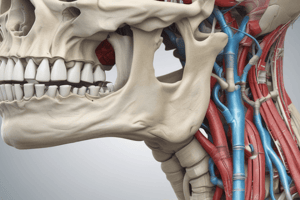Podcast
Questions and Answers
What type of joint is the temporomandibular joint (TMJ)?
What type of joint is the temporomandibular joint (TMJ)?
The temporomandibular joint (TMJ) is a modified hinge type of synovial joint.
What movements does the temporomandibular joint (TMJ) permit?
What movements does the temporomandibular joint (TMJ) permit?
It permits gliding (translation) and a small degree of rotation (pivoting) in addition to flexion (elevation) and extension (depression) movements typical for hinge joints.
What are the bony articular surfaces involved in the temporomandibular joint (TMJ)?
What are the bony articular surfaces involved in the temporomandibular joint (TMJ)?
The mandibular fossa and articular tubercle of the temporal bone superiorly and the head of the mandible inferiorly.
What separates the two bony articular surfaces in the temporomandibular joint (TMJ)?
What separates the two bony articular surfaces in the temporomandibular joint (TMJ)?
To what does the loose fibrous layer of the joint capsule attach?
To what does the loose fibrous layer of the joint capsule attach?
What is the function of the articular disc in the temporomandibular joint (TMJ)?
What is the function of the articular disc in the temporomandibular joint (TMJ)?
What attaches to the margins of the articular cartilage on the temporal bone and around the neck of the mandible?
What attaches to the margins of the articular cartilage on the temporal bone and around the neck of the mandible?
What creates the separate superior and inferior articular cavities in the temporomandibular joint (TMJ)?
What creates the separate superior and inferior articular cavities in the temporomandibular joint (TMJ)?
What are the bony articular surfaces involved in the temporomandibular joint (TMJ) completely separated by?
What are the bony articular surfaces involved in the temporomandibular joint (TMJ) completely separated by?
What type of synovial joint is the temporomandibular joint (TMJ)?
What type of synovial joint is the temporomandibular joint (TMJ)?
Flashcards
Temporomandibular Joint (TMJ)
Temporomandibular Joint (TMJ)
A modified hinge type of synovial joint in the jaw.
Movements of TMJ
Movements of TMJ
Permits gliding, rotation, flexion, and extension movements.
Bony Articular Surfaces of TMJ
Bony Articular Surfaces of TMJ
Involves the mandibular fossa and articular tubercle of the temporal bone, plus the head of the mandible.
Articular Disc Function
Articular Disc Function
Signup and view all the flashcards
Joint Capsule Attachment
Joint Capsule Attachment
Signup and view all the flashcards
Fibrocartilage in TMJ
Fibrocartilage in TMJ
Signup and view all the flashcards
Superior Articular Cavity
Superior Articular Cavity
Signup and view all the flashcards
Inferior Articular Cavity
Inferior Articular Cavity
Signup and view all the flashcards
Modified Hinge Joint
Modified Hinge Joint
Signup and view all the flashcards
Articular Cartilage
Articular Cartilage
Signup and view all the flashcards
Study Notes
Temporomandibular Joint (TMJ)
- TMJ is a modified hinge type of synovial joint
- Permits gliding (translation), rotation (pivoting), flexion (elevation), and extension (depression) movements
Bony Articular Surfaces
- Mandibular fossa and articular tubercle of the temporal bone (superiorly)
- Head of the mandible (inferiorly)
Joint Capsule
- Loose fibrous layer attaches to the margins of the articular cartilage on the temporal bone
- Attaches around the neck of the mandible
Articular Disc
- Intervening fibrocartilage between the two bony articular surfaces
- Attached at its periphery to the internal aspect of the fibrous capsule
Articular Cavities
- Superior and inferior articular cavities, or compartments
- Lined by separate superior and inferior synovial membranes
Studying That Suits You
Use AI to generate personalized quizzes and flashcards to suit your learning preferences.
Description
Test your knowledge of the temporomandibular joint (TMJ) with this quiz. Explore the anatomy and movements of this synovial joint, and deepen your understanding of the bony articular surfaces involved.




